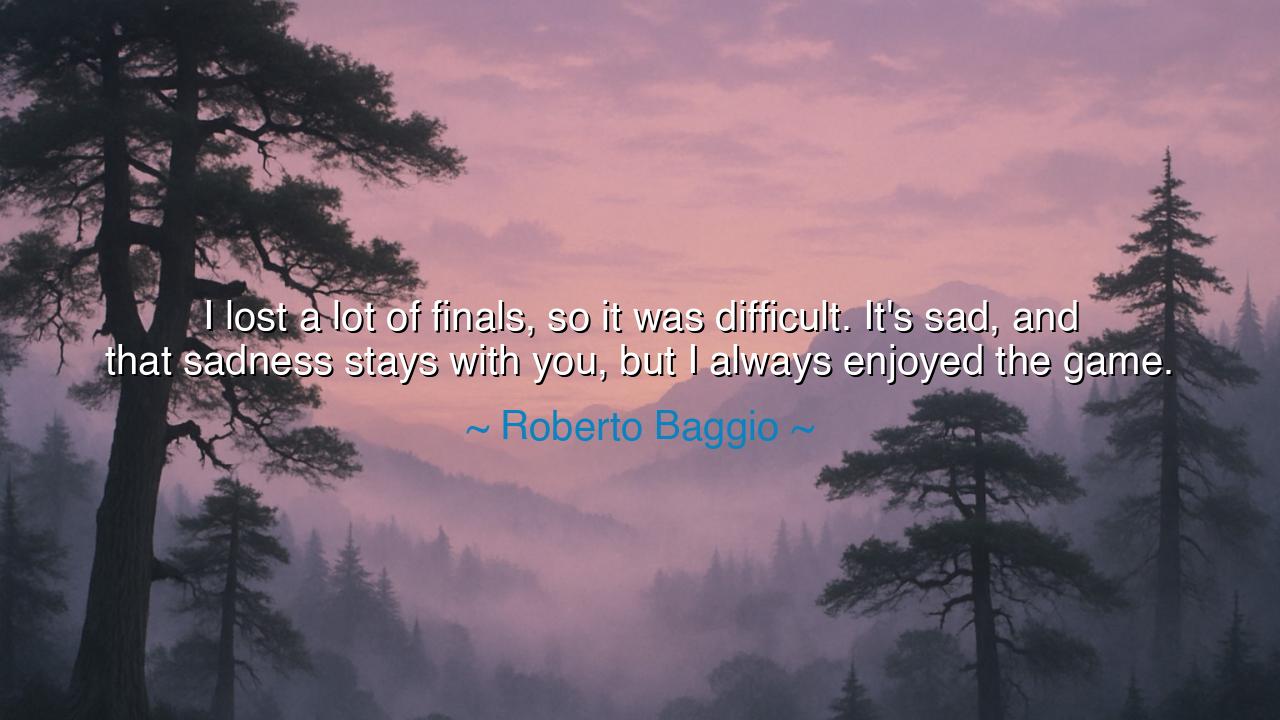
I lost a lot of finals, so it was difficult. It's sad, and that
I lost a lot of finals, so it was difficult. It's sad, and that sadness stays with you, but I always enjoyed the game.






Hear now, O seekers of endurance and grace, the words of Roberto Baggio, the divine ponytail of Italian football, whose brilliance was forever shadowed by both triumph and tragedy: “I lost a lot of finals, so it was difficult. It’s sad, and that sadness stays with you, but I always enjoyed the game.” In these few words lies the soul of the athlete, the philosopher, and the humble warrior—a man who has touched both glory and grief, yet found peace within the love of his craft. For Baggio speaks not merely of sport, but of life itself, where joy and sorrow forever walk hand in hand.
The origin of this quote reaches back to Baggio’s long and storied career—a career defined not only by moments of sublime beauty but also by wounds that never fully healed. He was the hero who carried Italy to the 1994 World Cup Final, only to be remembered for the penalty that soared over the crossbar, sealing defeat. That moment, etched into history, might have destroyed a lesser man. Yet Baggio endured, not by forgetting the pain, but by learning to live beside it. His words, spoken with gentleness and clarity, reveal a wisdom earned through suffering: that loss does not negate love, and that the beauty of a journey is not diminished by its heartbreaks.
In his confession, we find the timeless truth of the Stoic philosophers, who taught that pain is inevitable but suffering is a choice. The wise do not deny sadness; they embrace it, for it is the proof of having cared deeply. Baggio’s sadness “stays,” as he says, not to torment him, but to remind him of his humanity. Just as the sculptor’s chisel leaves marks upon marble to bring forth form, so too do our failures carve the depth of our character. His ability to love the game despite his defeats is the essence of courage—the quiet heroism that endures when applause fades and the heart remains scarred but steadfast.
Consider also the example of Michael Jordan, who missed thousands of shots and lost hundreds of games, yet declared that failure was the foundation of his success. Like Baggio, he found meaning not in perfection but in persistence. Both men understood that true mastery lies not in avoiding defeat, but in finding joy even in the struggle. Their greatness was not born of victory alone, but of the grace with which they bore loss. The sadness they carried was not a burden—it was the price of passion honestly lived.
Baggio’s reflection also carries a spiritual dimension. In his later years, he turned deeply toward Buddhism, seeking peace beyond worldly accolades. His words echo that enlightenment: the realization that sorrow, when accepted without resistance, becomes wisdom. To “enjoy the game” despite the ache of loss is to transcend ego, to love life not for its rewards but for its rhythm. In this, Baggio becomes more than an athlete; he becomes a teacher, showing that contentment is born not from outcome, but from devotion.
From his experience arises a lesson for all who strive: Do not fear loss, for it is the companion of every noble pursuit. To love anything—whether a dream, a craft, or a person—is to risk pain. But that pain, if carried with dignity, becomes a mark of authenticity. When you fail, do not seek to erase the sadness. Let it remain as a quiet reminder that you dared greatly, that you gave your heart to something worth breaking for. Sadness and joy are twin pillars of meaning, and one cannot exist without the other.
Practical wisdom follows: When you fall short of your goal, pause not in bitterness but in gratitude. Reflect, learn, and return to the field—whatever your field may be—with renewed purpose. Like Baggio, cherish the game itself, not the trophies it may or may not yield. For only the one who continues to love amid loss truly conquers.
Thus, let the words of Roberto Baggio echo through time: that sadness, when borne with grace, becomes a kind of beauty. The world remembers him for the penalty he missed, but those who listen to his heart will remember him for something greater—the courage to say, “It hurt, but I still loved the game.” And so must we all learn to live: not without sorrow, but with love stronger than defeat.






AAdministratorAdministrator
Welcome, honored guests. Please leave a comment, we will respond soon